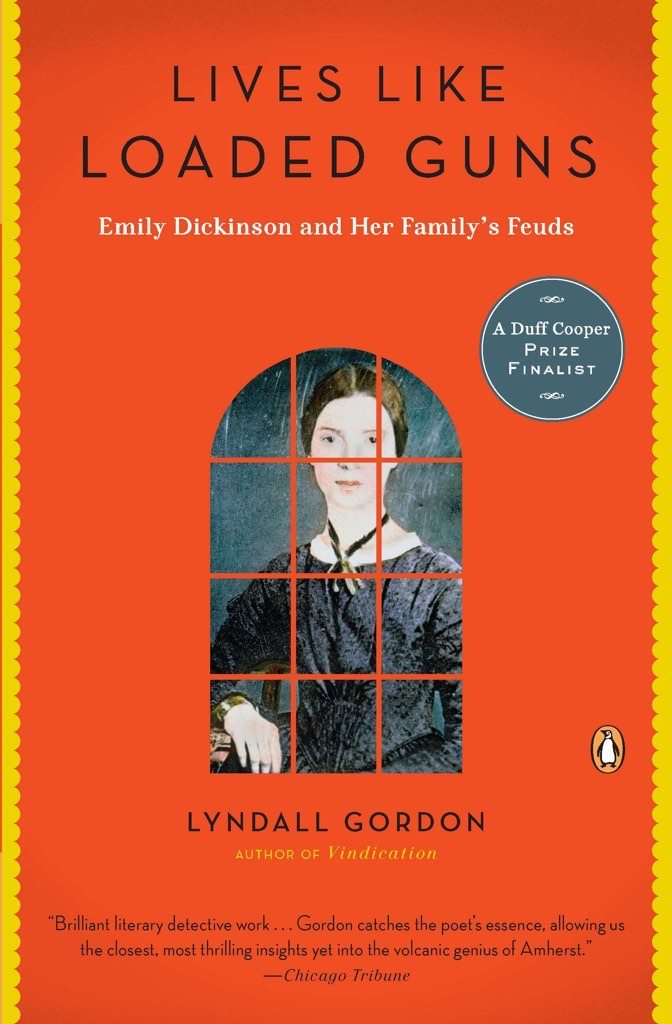Lives Like Loaded Guns: Emily Dickinson and Her Family's Feuds
Summary (from the publisher): In 1882, Emily Dickinson's brother Austin began a passionate love affair with Mabel Todd, a young Amherst faculty wife, setting in motion a series of events that would forever change the lives of the Dickinson family. The feud that erupted as a result has continued for over a century. Lyndall Gordon, an award-winning biographer, tells the riveting story of the Dickinsons, and reveals Emily as a very different woman from the pale, lovelorn recluse that exists in the popular imagination. Thanks to unprecedented use of letters, diaries, and legal documents, Gordon digs deep into the life and work of Emily Dickinson, to reveal the secret behind the poet's insistent seclusion, and presents a woman beyond her time who found love, spiritual sustenance, and immortality all on her own terms. An enthralling story of creative genius, filled with illicit passion and betrayal, "Lives Like Loaded Guns" is sure to cause a stir among Dickinson's many devoted readers and scholars.
Review: This joint family biography covers the lives of the Dickinsons, a prominent family with strong ties to their home in Amherst, Massachusetts. In the family homestead lived the reclusive poet Emily and her sister Lavinia and next door was their brother Austin, his wife Sue, and their three children. When Austin began a passionate affair with Mabel Todd, a married faculty wife, it set in motion a series of events that continued for over a century and forever altered the fate of Emily's poetry and published works.
Presenting this book as a family biography worked well because, as most everyone knows, Emily's life was largely uneventful and behind closed doors. It was her family that was out in the world doing while she sat in her room and produced a total of 1,789 poems. Furthermore, her brother's affair and the subsequent effect on his marriage, had a profound impact on Emily's legacy. Mabel, the married woman who became the focus of Austin's obsession, was intent on earning a spot in the prominent Dickinson family one way or another. While she failed to become Austin's wife, she then used her relationship with Lavinia to get her to hand over the poems so that she could edit and type them into a form presentable for publication, which was an extremely labor-intensive process that took years. However, Austin's wife, who felt wronged by her husband's betrayal and carried significant anger towards Mabel, and felt Emily's legacy was more rightly hers. Emily and her sister-in-law had been extraordinarily close and it appears that Emily did side with Sue over the affair. After Lavinia and later Sue's deaths, Sue's daughter and Emily's niece Mattie took up the torch of fighting to be the heir to Emily's legacy. Meanwhile, Mabel and eventually her daughter Millicent believed they were rightly the editors of Emily's work and deserved the credit. The feud continued for decades.
Gordon presents a compelling argument that Emily was secreted away in her family home because she suffered from epilepsy. She visited doctors and was prescribed medication consistent with this diagnosis and had a nephew who also suffered from the same disease. Whatever the cause, her seclusion at home freed her to explore her craft of writing: "Emily Dickinson wasn't required to earn her living in the drudging ways then open to women; she was also relieved of the pressure to marry" (98).
At heart this is a story about a family splintered apart first by adultery and later by contested inheritance. It's amazing that such a quiet life, mostly spent in her bedroom, was still surrounded by family drama that continued decades after her death.
Stars: 4



Comments
Post a Comment